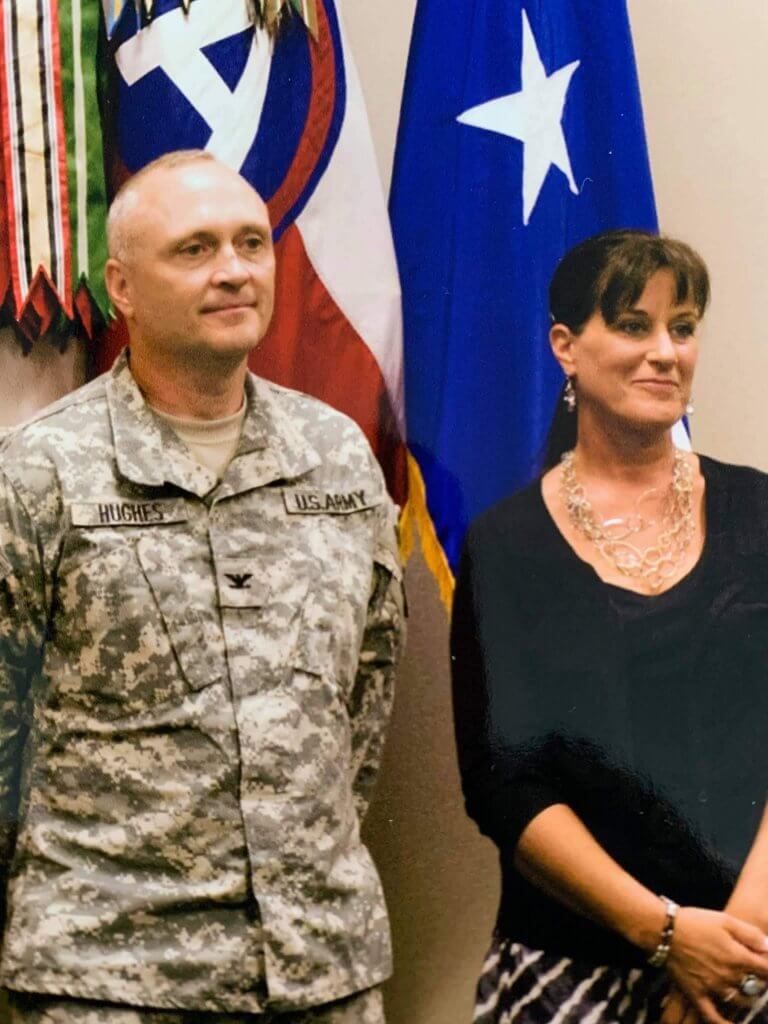The walls shook: Veteran recounts 9/11 from inside the Pentagon

A Pentagon crew unfurls an American flag at dawn at the Pentagon, on the 18th anniversary of the 9/11 attacks, Washington, D.C., Sept. 11, 2019. (DoD photo by U.S. Army Staff Sgt. Nicole Mejia)
On the morning of Sept. 11, 2001, retired Col. Bob Hughes was in the Pentagon. He was new to the area, new to his workspace, and when the building was struck, he said it seemingly took place in slow motion.
Assigned to the Army’s G3 Force Management Directorate, Hughes was three months into his new job when he felt the concussion of the explosion. Items lifted off the desks. Ceiling tiles moved. Soon after, debris started falling and a downwind of smoke that filled the building.
Hughes, along with his office mates from ring A, weren’t sure what had happened. Alarms began to sound. They were dazed and made their way to the parking lot, he said. Someone made a path, and when possible, Hughes and his co-workers helped keep that area open for emergency vehicles.
“We were dazed. We all wondered what had happen. It was a clear day,” he said, referencing the common assumption that the crash had been an accident, yet the clear skies didn’t quite add up.
The day, he said, was a blur of trying to determine what happened, finding where everyone had ended up, and helping others whenever possible. Here and there people would come through needing assistance, while he and others did their best to lend a hand.
For the next four to five hours, there was a plan of accountability. Bosses were looking for subordinates and office mates were locating each other. Hughes, who had been in the Army since 1987, said he hadn’t experienced anything quite like it – complete chaos and creating a plan as they went.
Meanwhile, Hughes’ personal belongings were back at his desk. His wallet, his phone, keys all sat securely inside his drawer, unattainable.
It wasn’t until he started the journey home to Springfield, Virginia, that he and others learned what happened. After a Metro ride to a hotel lobby, they saw the TVs displaying the attacks.
“That was the first I had seen of what was going on,” he said.
Next, without a cell phone – and jammed lines at that – Hughes found a payphone and made a collect call to his wife, Gina.
“People had been calling all day to ask about Bob,” she said. “I just kept saying, ‘I don’t know, I can’t talk’ then I’d hang up. All day long. I figured ‘If he’s safe he’ll call me’ … until finally he did. That was the best feeling ever, knowing he was OK.”
Hours later, Bob called her from a local train station where she went to pick him up.
Gina cites the event being hard for their family to work through. There were constant reminders throughout town: their kids’ school that was shut down, Fort Belvoir’s security measures, the Pentagon remaining damaged.
“It was eerie almost, everything went into lockdown,” she said. “When it finally opened back up, I didn’t want him to go.”
Meanwhile, Bob says it was strange to return to his office and almost turn back time.

“Surreal is probably the right word. To see the office how I had left it and where everything was at, what I was working on that day. It was surreal.”
In years since, the Hughes said they’ve come to terms with Bob’s 9/11 story in their own way.
Bob reflects on how his leaders cared for everyone during a time of panic.
“I often think about it and the leaders I worked for were really good at making sure everyone was OK and taking care of that first. Then to get focused on what we needed to do for the future,” he said.
In the Pentagon, 125 people were killed on Sept. 11, including one of Bob’s school acquaintances. While Bob and his co-workers were uninjured, he understands the fate that others met.
“It just really mattered where you were that day. I often think about that – it was a matter of location,” he said.
Gina, an elementary special education teacher, talks with her students about it every year.
“I tell the kids about what happened,” she said. “The kids I work with weren’t alive yet and I still get choked up. I get teary eyed telling them what happened.”
